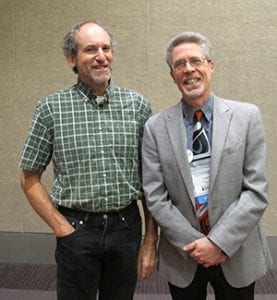News
Plant Science Research Network Launches

Funding for the new Plant Science Research Network was awarded to David Stern at the Boyce Thompson Institute for Plant Research and Crispin Taylor at the American Society of Plant Biologists.
To further their goals of promoting innovative research and collaboration within the greater plant science community, the Boyce Thompson Institute for Plant Research (BTI) and the American Society of Plant Biologists (ASPB) are pleased to announce the formation of the Plant Science Research Network (PSRN). Founding members include the American Society of Plant Biologists, the Alliance of Crop, Soil and Environmental Science Societies, the American Phytopathological Society, the American Society for Horticultural Science, the Botanical Society of America, the Genetics Society of America and the Council on Undergraduate Research.
The National Science Foundation (NSF) has awarded BTI President David Stern and ASPB Executive Director Crispin Taylor $730,000 in support for five years to realize the full potential of plants through the advancement of research and education. The PSRN builds on the success of the Decadal Vision report, Unleashing a Decade of Innovation in Plant Science: A vision for 2015-2025, the culmination of a multiyear effort to unite a broad spectrum of plant scientists around a scientific agenda. The Research Coordination Network (RCN) award from the NSF will provide support for new collaborations, especially related to the development of community-wide standards for exchanging data and metadata.
The objectives of the PSRN are to harness the collective vision and broad expertise of the plant science research community to support agricultural sustainability and growth of the bioeconomy, in an era where population growth and environmental pressures require careful stewardship of natural resources.
“The PSRN is an ambitious effort to make it easy for plant scientists to acquire and deploy a range of experimental and soft skills. The diversity of plant science represented in the RCN members is a tremendous strength, but also a challenge to developing a cohesive vision for research and training. Our hope is to accelerate the building of knowledge and careers that will be needed to meet our society’s challenges,” said Stern.
There is a need for improved graduate and postdoctoral training in the plant sciences because academia is not the only career young plant scientists are pursuing—students are interested in leadership, science communications and entrepreneurial careers.
According to Taylor, “the PSRN will use dedicated workshops to devise novel solutions to broaden participation in plant sciences and to reimagine plant science graduate student and postdoctoral training.”
PSRN activities will directly benefit member societies and associated plant scientists by ensuring that researchers are aware of each other’s efforts, which will yield more opportunities for collaboration, especially interdisciplinary projects that enrich the body of plant science knowledge. The PSRN will promote a cohesive message from the plant community and actively engage other organizations. The network will also create recruitment and training opportunities for young scientists and broaden participation of underrepresented groups in the plant sciences.
 Plantae.org, a new digital ecosystem for the global plant science community that launches in Fall 2015 will enable effective data management and sharing among PSRN members. Plantae will facilitate connections among the members of multiple scientific societies, and will be used to share information about meetings, events, job postings, educational programs and opportunities for funding in the plant sciences.
Plantae.org, a new digital ecosystem for the global plant science community that launches in Fall 2015 will enable effective data management and sharing among PSRN members. Plantae will facilitate connections among the members of multiple scientific societies, and will be used to share information about meetings, events, job postings, educational programs and opportunities for funding in the plant sciences.
The PSRN seeks broad participation from the plant science community and will be open to any interested scientific professional associations and stakeholders.
To get involved, or for further information, contact the PSRN Executive Coordinator, Natalie Henkhaus at nhenkhaus@aspb.org.
The Plant Science Research Network receives funding from National Science Foundation award #IOS-1514765.



